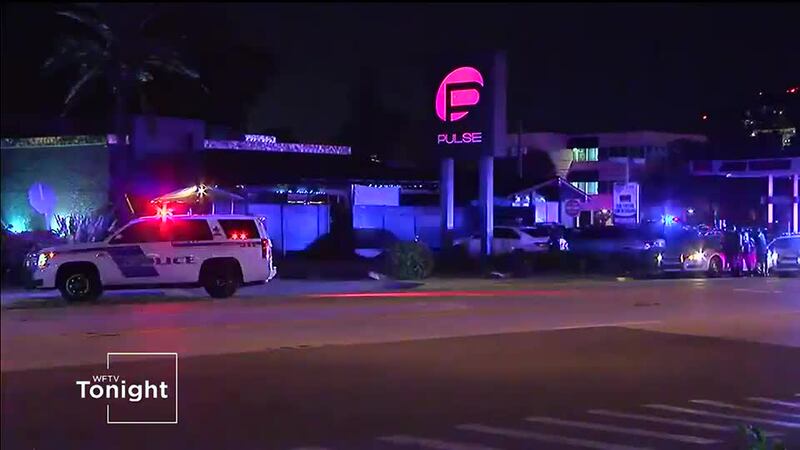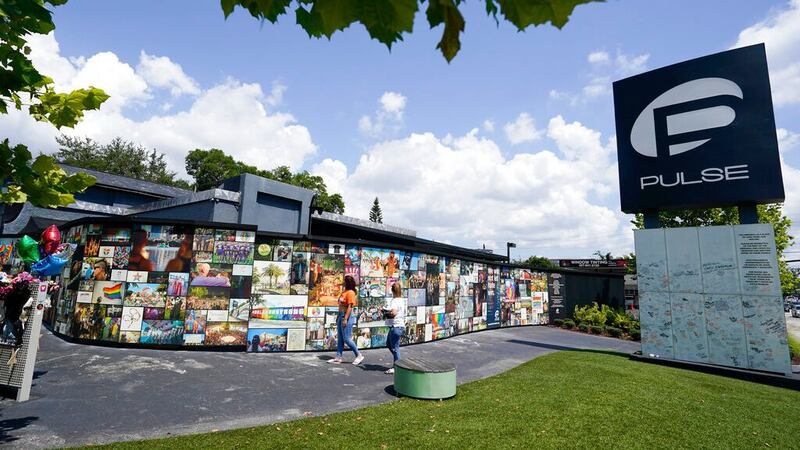ORANGE COUNTY, Fla. — On the day Orlando marked the 6th anniversary since the Pulse Nightclub massacre, one of the deadliest mass shootings in the nation’s history, a glimmer of hope emerged out of Washington that something would finally be done to curb gun violence.
>>> STREAM CHANNEL 9 EYEWITNESS NEWS LIVE <<<
Ten Democrats teamed up with an equal number of Republicans to agree on a framework of a compromise that would pass the filibuster-happy Senate, if all Democrats were to support it. According to the leading negotiator, Democratic Senator Chris Murphy (CT), it includes:
- Funding to encourage states to implement red-flag laws, which allows a judge to temporarily allow police to seize a person’s guns if they pose a danger to themselves or someone else. Florida already has this law.
- Funding for school safety measures, details of which are unknown
- Funding for mental health initiatives, including a national build-out of clinics
- Banning people convicted of domestic abuse from buying guns, often called the “boyfriend loophole.”
- New federal laws against gun trafficking and straw purchasing, where someone buys a gun on behalf of a person who is forbidden from owning one, such as a felon
- Expanding background checks for people younger than 21 to include juvenile criminal records
The compromise agreement doesn’t include many items Democrats and gun violence advocates include on their wish lists, such as banning people younger than 21 from owning military-style weapons or limiting the capacity of magazines.
READ: Company connected to onePULSE Foundation purchases properties neighboring Pulse nightclub
That, coupled with the inclusion of gun-specific items, opens the framework to attacks by both Democrats and Republicans that could make it difficult to become law.
Eyewitness News sat down with advocates representing both sides to get their thoughts.
From the gun control advocate’s perspective:
Patti Brigham’s first reaction to the framework was mild disappointment. Sitting in her Orlando living room, she ran through the policies she has spent years campaigning for. The magazine limitations and so-called assault weapons bans that she said would truly make America safer.
“Civilians don’t need to be walking around with these AR-15-style weapons that are used on the battlefield,” she said, plainly.
READ: Central Florida remembers Pulse nightclub victims 6 years after mass shooting
Brigham, currently the leader of Prevent Gun Violence Florida, has spent years in the political arena in different capacities. Ever since Pulse though, her focus has been on the proliferation of guns. The mass shootings frequently in the news these days, sure, but also the stories of a toddler who found a gun on a shelf and accidentally shot themself.
Her experience, though, lets her know that progress can be slow. Compromising isn’t easy for anyone – much less when you believe you’re on moral high ground that shouldn’t be political or controversial.
While she was hesitant to form any final opinions without seeing the language of the agreement, she called it a good – albeit tiny – first step in the right direction.
“We would certainly hope that there would be some common ground here,” she said. “This isn’t a revolutionary package of proposals. This is not a gun grab by any stretch of the imagination.”
Brigham repeated a line often mentioned by gun control advocates these days: the United States is far from the only country with violent video games or mental health issues, but it accounts for almost all the mass shootings.
While she was encouraged that more mental health resources would be pouring into states like Florida, she said it would be irresponsible to ignore the other side of the issue. While Florida has a red flag law on its books already, she said it needed to be strengthened to allow family members to file requests in court, along with law enforcement.
Despite her being open to the early compromise, she said she expected more moving forward. In her mind, guns are tools to be used for activities like hunting, not to own for their looks. Long-term, she expects restrictions to be enacted on the types of weapons someone can own and how many bullets they can carry, along with strict safe-storage requirements.
She believes the winds are shifting in her favor.
“Common sense needs to prevail here,” she said. “It’s time for lawmakers to start listening to their constituents.”
From the gun rights advocate’s perspective:
James Phillips’ office is decorated with an array of gun memorabilia — something you wouldn’t find in a normal corporate setting.
It’s not surprising. The Second Amendment attorney, with Lake Mary-based Katz & Phillips, spends his life defending the rights of gun owners. He knows state laws front to back, but his favorite is the amendment all his views are based on.
“The Second Amendment specifically says the right to bear arms shall not be infringed,” he said, when asked if the framework was an acceptable compromise.
In short, his answer was no.
While Phillips supported the funding for mental health and school security and was not yet ready to take a position on the licensing definitions, he knew what he was solidly against: expanded background checks and especially red flag laws, which he views as potentially unconstitutional.
“People are taking advantage of it,” he said. “All it takes is literally someone angry at another person saying ‘Hey, that person threaten to shoot somebody, oh, he’s got lots of guns.’ That person will lose their right to possess firearms without a hearing, no due process whatsoever.”
Phillips’ views can best be defined as near-absolutist. In his mind, a person has the right to own any weapon they want – be it a pistol, machine gun or tank – until they prove they’re not capable or responsible enough to keep it. He says no right comes without restrictions, of course, but his restrictions apply to those who have already have a black mark on their record, like a felon.
The other part of the second amendment, cited by Brigham, “a well-regulated militia,” is a separate right entirely, he said.
“There is a right to militia, but there’s also an individual right to bear arms,” Phillips said. “Two separate things, one has really nothing to do with the other.”
So, what would be an ideal compromise framework for him? More funding for mental health. More security for schools. No restrictions on guns or magazines for responsible and law-abiding adults. Only if America were to fully fund a world-class mental health system that reached everyone who needed it, and shootings continued to rise would he be open to looking at gun policies, he said.
“Evil people are going to do evil things, no matter what we do,” he said. “If we try and restrict [guns], they’re still going to find a way to commit the crimes that they want to commit.”
Click here to download the free WFTV news and weather apps, click here to download the WFTV Now app for your smart TV and click here to stream Channel 9 Eyewitness News live.
©2022 Cox Media Group








